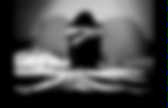

The Pill That Could Cure Depression by Growing Your Brain. Ketamine: A miracle antidepressant? More data is now available—this time from the Ben Taub General Hospital in Houston, Texas—suggesting that the “club drug” ketamine can rapidly relieve symptoms of major depression.

Ketamine, or Special K as it is known on the streets, when used illicitly, can cause feelings of unreality and hallucinations. Its side effects—even when given in a medical environment (where it is given intravenously)—can include psychotic experiences, bladder problems and heart problems. The truly astounding benefits reported by some of the depressed patients in Texas (and previously reported by researchers at Yale University), however, mean it is time to ramp up research into whether intravenous doses of ketamine, administered by doctors, will prove to be a very powerful new tool in fighting major depression and, perhaps, other conditions including panic disorder and obsessive-compulsive disorder.
Dr. Ablow is the author of "Inside the Mind of Casey Anthony. " Dr. Deep-Brain Stimulation Found to Fix Depression Long-Term. Deep depression that fails to respond to any other form of therapy can be moderated or reversed by stimulation of areas deep inside the brain.
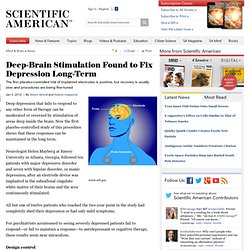
Now the first placebo-controlled study of this procedure shows that these responses can be maintained in the long term. Neurologist Helen Mayberg at Emory University in Atlanta, Georgia, followed ten patients with major depressive disorder and seven with bipolar disorder, or manic depression, after an electrode device was implanted in the subcallosal cingulate white matter of their brains and the area continuously stimulated.
All but one of twelve patients who reached the two-year point in the study had completely shed their depression or had only mild symptoms. For psychiatrists accustomed to seeing severely depressed patients fail to respond—or fail to maintain a response—to antidepressant or cognitive therapy, these results seem near miraculous. DBS is hardly a quick fix for depression though. How to increase serotonin in the human brain without drugs. Search for Faster, Better Antidepressants Makes Progress. Blog » Blog Archive » 23 Surprisingly Effective Treatments for Depression (One Year Later)
For the live-updated, interactive version of this infographic, click here.
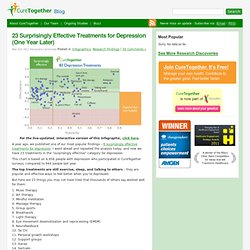
A year ago, we published one of our most popular findings – 6 surprisingly effective treatments for depression. I went ahead and repeated the analysis today, and now we have 23 treatments in the “surprisingly effective” category for depression. Braving the Day. The hardest thing by far for me to do when I'm depressed is to get into the shower.
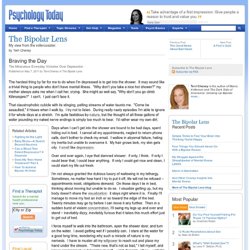
It may sound like a trivial thing to people who don't have mental illness. "Why don't you take a nice hot shower? " my mother always asks me when I call her, crying. The benefits of meditation. Studies have shown that meditating regularly can help relieve symptoms in people who suffer from chronic pain, but the neural mechanisms underlying the relief were unclear.
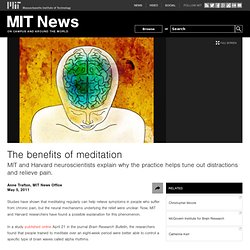
Now, MIT and Harvard researchers have found a possible explanation for this phenomenon. In a study published online April 21 in the journal Brain Research Bulletin, the researchers found that people trained to meditate over an eight-week period were better able to control a specific type of brain waves called alpha rhythms. “These activity patterns are thought to minimize distractions, to diminish the likelihood stimuli will grab your attention,” says Christopher Moore, an MIT neuroscientist and senior author of the paper.
“Our data indicate that meditation training makes you better at focusing, in part by allowing you to better regulate how things that arise will impact you.” A 1966 study showed that a group of Buddhist monks who meditated regularly had elevated alpha rhythms across their brains. The Science and History of Treating Depression. Brain Not Required For Antidepressant To Act. Scan't Evidence: Do MRIs Relieve Symptoms of Depression? When a researcher asks a volunteer to slide head-first into the open eye of a magnetic resonance imaging (MRI) machine, the expectation is that the device's magnetic field will penetrate the skull to produce a faithful picture of the brain without changing its behavior.
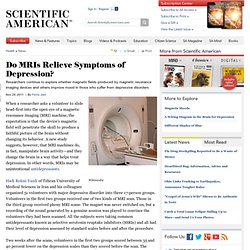
A new study suggests, however, that MRI machines do, in fact, manipulate brain activity—and they change the brain in a way that helps treat depression. In other words, MRIs may be unintentional antidepressants. Hadi Rokni-Yazdi of Tehran University of Medical Sciences in Iran and his colleagues organized 51 volunteers with major depressive disorder into three 17-person groups. Volunteers in the first two groups received one of two kinds of MRI scan. Those in the third group received phony MRI scans: The magnet was never switched on, but a recording of the sound generated by a genuine session was played to convince the volunteers they had been scanned.
"We're still in the early stages," Rohan stresses. Brain-training games stop depression before it starts - health - 01 November 2011. It may be possible to stave off depression before it even appears using brain-training software so simplistic in its design that even the psychologist testing it once bet it wouldn't work.
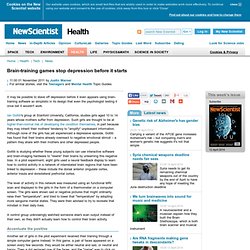
Ian Gotlib's group at Stanford University, California, studies girls aged 10 to 14 years whose mothers suffer from depression. Such girls are thought to be at higher-than-normal risk of developing the condition themselves, in part because they may inherit their mothers' tendency to "amplify" unpleasant information. Although none of the girls has yet experienced a depressive episode, Gotlib has found that their brains already overreact to negative emotional stimuli – a pattern they share with their mothers and other depressed people.
Gotlib is studying whether these young subjects can use interactive software and brain-imaging hardware to "rewire" their brains by unlearning this negative bias. Accentuate the positive. Anhedonia. Written by Colin Brennan, medical journalist Anhedonia is the inability to gain pleasure from enjoyable experiences.
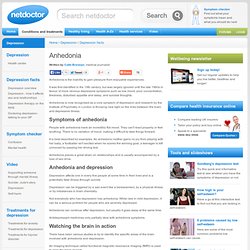
It was first identified in the 19th century, but was largely ignored until the late 1980s in favour of more obvious depressive symptoms such as low mood, poor concentration, tiredness, disturbed appetite and sleep, and suicidal thoughts. New View of Depression: An Ailment of the Entire Body. David Perez on living with depression, overcoming two suicide attempts, and moving forward.